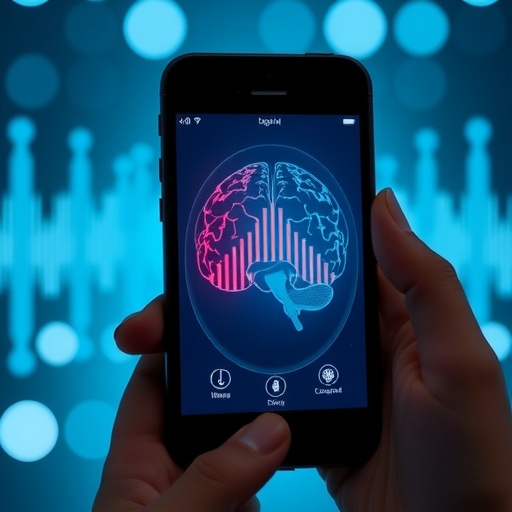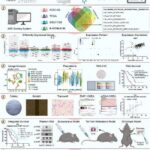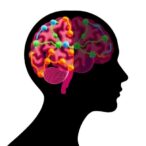
The burgeoning field of mental health diagnostics has witnessed a transformative leap forward with recent research that pioneers the use of smartphone sensors to detect major forms of psychopathology. This groundbreaking study uncovers the potential of our ubiquitous handheld devices not merely for communication and entertainment but as pivotal tools in the realm of mental health assessment. As technology continues to saturate everyday life, understanding its applications in healthcare presents an unprecedented opportunity to improve how we monitor and treat mental health conditions.
At the heart of this investigation lies a novel approach to symptom detection that harnesses the capabilities of existing smartphone technology. Smartphones are equipped with a myriad of sensors, including accelerometers, gyroscopes, and even GPS trackers. These devices can collect rich datasets about our daily activities, social interactions, and even physiological responses. The researchers deftly utilized this data, looking beyond conventional parameters to find correlations between behavioral patterns captured on these devices and the psychological states of individuals.
The implications of the study are profound. Traditional methods for diagnosing mental health conditions often rely on self-reported symptoms or assessments conducted in clinical settings, which can lead to gaps in accuracy and consistency. The advent of smartphone-based monitoring tools could bridge these gaps, providing real-time data that enables healthcare professionals to identify and understand patients’ mental health crises more accurately and promptly. This could lead to timely interventions tailored to the individual’s condition, enhancing therapeutic outcomes significantly.
.adsslot_X0OF3kyrW6{width:728px !important;height:90px !important;}
@media(max-width:1199px){ .adsslot_X0OF3kyrW6{width:468px !important;height:60px !important;}
}
@media(max-width:767px){ .adsslot_X0OF3kyrW6{width:320px !important;height:50px !important;}
}
ADVERTISEMENT
Moreover, as mental health issues continue to rise globally, the integration of technology into psychological practices appears to be a necessary evolution. The ability to monitor mental health remotely and continuously could expand access to care for those in underserved areas, offering them the possibility of ongoing engagement with mental health services. This proactive approach to mental health management could mitigate the escalation of symptoms or crises, ultimately contributing to a more robust public health strategy.
The methodology employed in the study involved a diverse cohort that accurately reflects the population at large, accounting for various demographic factors that can influence mental health. Participants were monitored over an extended period, and data collection was rigorous, ensuring that researchers could draw reliable conclusions from the myriad variables involved. The findings suggest a strong correlation between specific sensor data patterns and discernible mental health disorders, reinforcing the need for further exploration in this field.
Researchers acknowledge that while the study lays a strong foundation, it is merely the beginning of a series of investigations needed to refine these methods for widespread clinical use. Future research will undoubtedly delve deeper into refining algorithms that can interpret the collected data, potentially integrating machine learning techniques to enhance prediction accuracy. The key challenge lies in translating the raw data into actionable insights that mental health professionals can utilize in treatment planning.
Furthermore, there are ethical considerations that must be addressed in this burgeoning field of digital mental health assessment. With privacy concerns and the potential for data misuse, establishing stringent protocols for the protection of personal health information becomes paramount. Transparent data use policies and patient consent mechanisms will be essential in fostering trust and collaboration between patients and providers in this evolving landscape.
The study ultimately suggests a promising future where mental health assessments are seamless, continuous, and integrated into our daily lives through the technology that many of us already carry. As these tools become more sophisticated, they could play a crucial role in demystifying mental health disorders, reducing stigma, and encouraging individuals to seek help without the barriers traditionally associated with mental health care.
In conclusion, converting smartphones into mental health monitors could revolutionize the treatment and understanding of psychological disorders, fostering a more informed and responsive healthcare environment. The integration of real-time data into the detection and management of psychopathology is an exciting frontier that holds the potential for more vibrant and proactive forms of care. As studies like this pave the way for technological norms within mental health, the future looks promising for improved access to mental health resources worldwide.
This trailblazing research reveals that the intersection of technology and mental health is no longer a distant vision; it is a burgeoning reality that creates new pathways for patient care. With an expansion of smartphone functionalities into tracking and interpreting mental health data, the global healthcare landscape may soon see a paradigm shift that prioritizes mental wellness through innovative strategies.
Harnessing the power of technology to address psychological issues not only promotes better health outcomes but also elevates society’s understanding of mental health as an essential component of our overall well-being. Collaborative efforts between researchers, clinicians, and tech developers will be pivotal in fostering tools that simplify mental health monitoring while safeguarding individual rights to privacy and autonomy. As we stand on the brink of this new era, it is crucial to continue exploring how digital solutions can symbiotically enhance traditional methods, enabling a holistic approach to mental health that is accessible to all.
Subject of Research: Detection of psychopathology through smartphone sensors
Article Title: Harnessing Smartphone Technology to Detect Major Forms of Psychopathology
News Publication Date: [Insert Date]
Web References: [Insert URLs if available]
References: [Insert References if available]
Image Credits: [Insert Credits if available]
Keywords
Tags: behavioral patterns and psychologydata-driven mental health solutionsdetecting psychopathological conditionsimproving accuracy in mental health diagnosisinnovative mental health assessment toolsmental health symptom detectionmobile health applications for diagnosispassive monitoring of mental healthreal-time monitoring of psychological statessmartphone sensors for mental healthsmartphone technology and healthcaretechnology in mental health diagnostics



